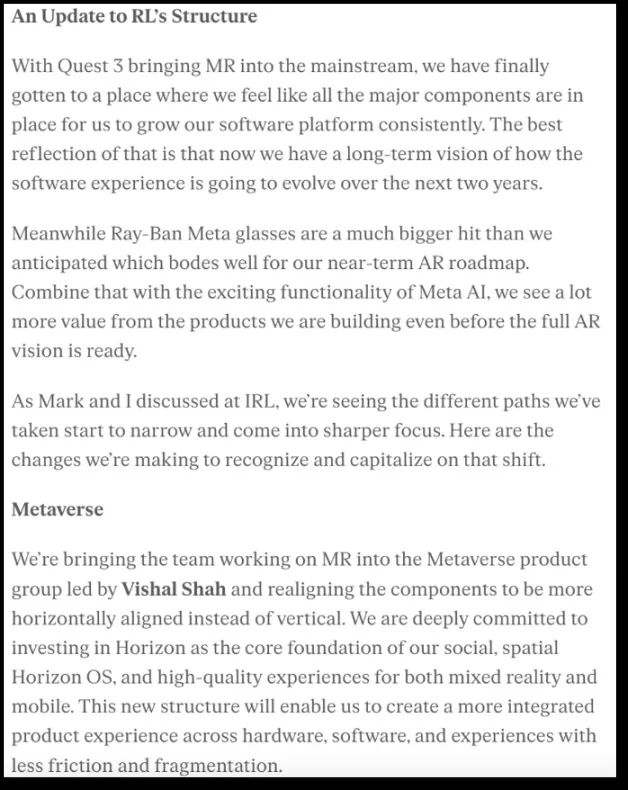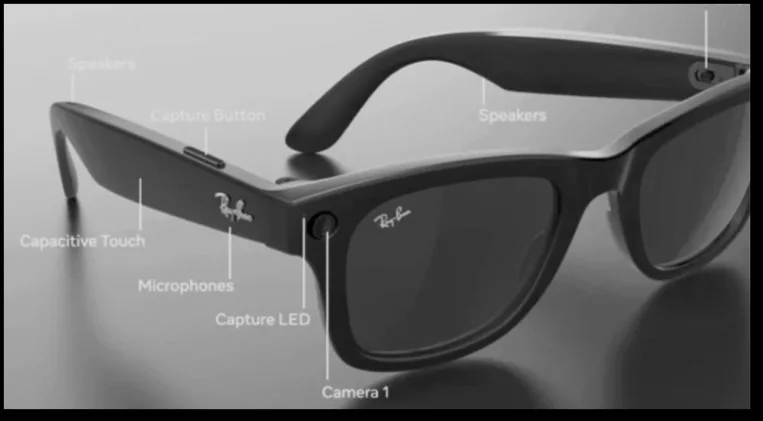Meta Restructures Reality Labs After AI Success

Reality Labs’ persistent losses have made Meta’s journey into the metaverse more challenging than SpaceX’s mission to Mars, and significant reforms continue.
Recently, Meta announced a major restructuring of Reality Labs, the division responsible for metaverse and virtual reality operations, splitting it into two separate units: “Metaverse” and “Wearable Devices.” The future plans are also divided into these two areas, with the Metaverse unit focusing on developing the Quest series of VR headsets, while the Wearable Devices unit will concentrate on smart glasses.
With this adjustment, Meta has elevated the importance of wearable devices within its internal operations. Company CTO Andrew Bosworth emphasized the strong market response to Meta’s Ray-Ban Meta smart glasses, stating that they have been “more successful than expected.”
The sales of these smart glasses have shown Meta the benefits AI can bring to XR hardware. After experiencing this success, Meta quickly integrated AI-enhanced hardware into Reality Labs’ structure, hoping that the development of new AI-driven hardware could turn around the department’s financial losses.
Addition of Wearable Devices to Reality Labs
Reality Labs, Meta’s metaverse division, has posted consecutive quarterly losses. In the first quarter of this year, Reality Labs saw a 30% year-over-year growth but still reported a loss of $3.85 billion, following a loss of $3.5 billion in the previous quarter. It is estimated that since 2019, Reality Labs has accumulated losses exceeding $50 billion (approximately 350 billion RMB).
These ongoing losses have cast a shadow over Meta’s metaverse ambitions, not only subjecting the company to internal operational pressures and shareholder skepticism but also inviting external ridicule of Zuckerberg’s metaverse dreams.
Following multiple rounds of layoffs, the restructuring of Reality Labs continues. The original division has been split into the “Metaverse Department,” responsible for the Quest headset product line, the Horizon social platform, and related technologies, and the “Wearable Devices Department,” which encompasses Meta’s other hardware and software products, including the smart glasses developed in partnership with Ray-Ban.
This restructuring is the largest since Meta’s rebranding in 2020.
In an internal memo to employees, Meta CTO Andrew Bosworth explained the purpose of the restructuring: the company remains committed to advancing MR and metaverse development, aiming to create more integrated product experiences through Meta AI.

From Bosworth’s memo, it is clear that smart glasses, wearable devices, and AI are the key focus areas. Traditional product lines of Reality Labs, such as the Quest series headsets and the Horizon social platform, are no longer highlighted.
Indeed, the market reality reflects this shift. The shipment forecast for the new Meta MR headset Quest 3 has been downgraded.
In October last year, Tianfeng International analyst Ming-Chi Kuo, who focuses on the XR hardware market, predicted that Quest 3’s initial shipment forecast for 2023 was over 7 million units. However, due to weak demand expectations, the 2023 shipment forecast was adjusted to 2-2.5 million units, with an estimated shipment of about 1 million units in 2024.
Facing reality, Meta must find a new path for Reality Labs. Zuckerberg once stated that the vision for the metaverse is so grand that he expects Reality Labs to become profitable by 2030, currently viewing this department as a “long-term investment in future planning.”
Now, wearable devices have been added as a new business unit to Reality Labs, largely because AI-powered hardware has shown potential for profitability. In his memo, Bosworth revealed that the market response to Meta’s Ray-Ban Meta smart glasses has been “more successful than expected.”
This implies that the revenue generated from this new hardware can directly reduce Reality Labs’ losses.
AI Boosts Sales of Meta’s New Hardware
“Wearable devices” are not new, but adding “smart” to them highlights the enhancements AI brings to hardware functionality. The impressive sales of Ray-Ban Meta smart glasses, as mentioned by Bosworth, are largely due to the integration of AI.
The first-generation product, Ray-Ban Stories, launched in September 2021, sold only 300,000 units by February 2023, with a monthly active user base of just 27,000, less than 10% of the total sold.
After Meta joined the partnership, the Ray-Ban Meta glasses, unveiled alongside the VR headset Meta Quest 3 in September 2023, sold over 300,000 units in Q4 2023 alone, nearly matching the total sales of the first generation. The Verge predicts that the product’s sales may have already surpassed 1 million units.
In contrast, the sales performance of Meta Quest 3 has fallen short of expectations. According to RoadToVR, during last year’s Black Friday period (a one-month timeframe), Amazon platform sales for Quest 2 and Quest 3 combined were about 240,000 units, with Quest 2 accounting for 70.2% of the sales, far exceeding Quest 3.
Meta also mentioned in a blog post that the Ray-Ban Meta product exceeded market expectations, stating, “The glasses are selling faster than we can produce them,” and the team is working on launching more new styles.

Unlike the first generation, the Ray-Ban Meta glasses show little change in appearance. This success story is significantly driven by AI enhancements.
In terms of hardware functionality, the Ray-Ban Meta glasses have undergone a comprehensive upgrade, including improvements in cameras, storage, speakers, microphones, standby time, and weight.
However, these are optimizations of existing hardware. The real breakthrough in functionality came with the introduction of AI features in April 2023. The “Hey Meta” voice command can directly activate the AI assistant on Ray-Ban Meta, enabling the glasses to perform object recognition, real-time translation, weather inquiries, and more.
Meta is extending the life of its metaverse strategy by adding “AI” to its products. This includes not only the Ray-Ban Meta smart glasses but also a major restructuring of Meta’s AI department on June 2, 2023, with the original Facebook AI Research (FAIR) being integrated into Reality Labs.
FAIR is a renowned AI research lab, founded in 2013 by deep learning pioneer Yann LeCun, who created the convolutional neural network and is a Turing Award winner. The lab’s influence in the deep learning framework field spans the entire ecosystem.
If XR hardware is the body supporting human entry into the metaverse, then AI is the brain. FAIR’s AI research not only aligns Reality Labs with the AI trend but also directly adds intelligence to Meta’s virtual reality hardware.
Andrew Bosworth has already declared the ambition to “build the entire Meta with artificial intelligence.”